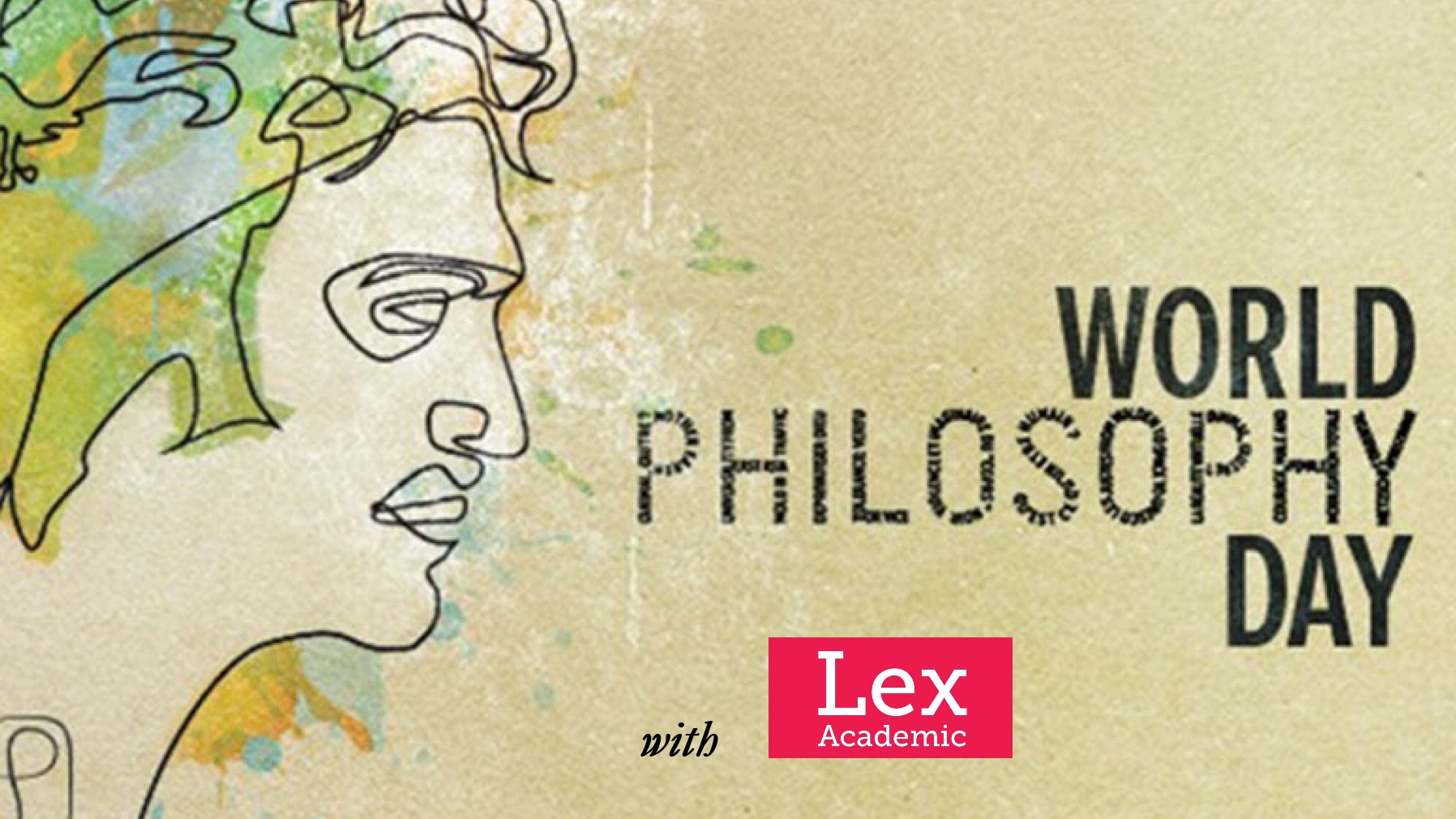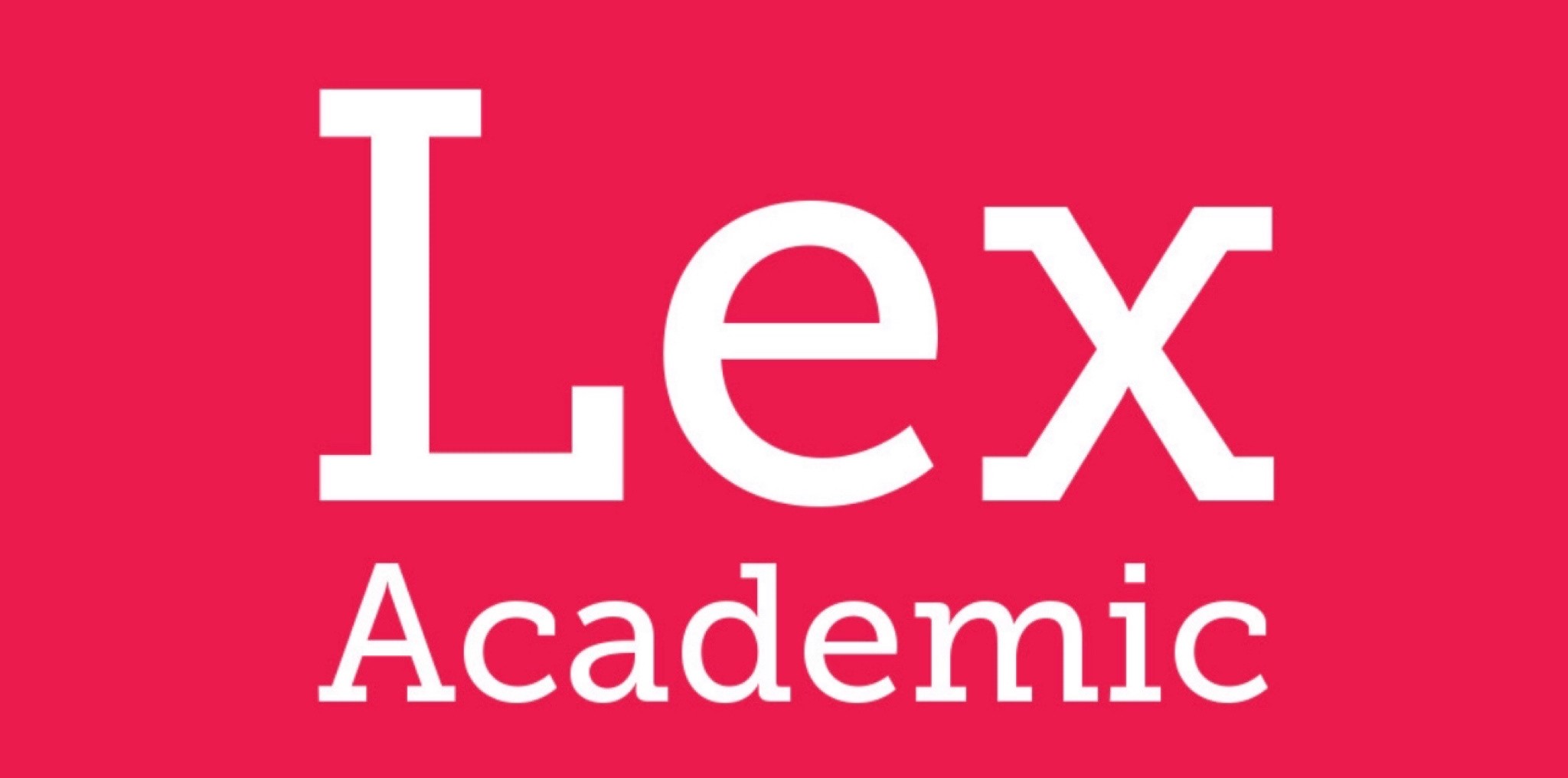World Philosophy Day - in Conversation with Lex Academic

It’s World Philosophy Day!
Today is a good day. Why? Because it’s World Philosophy Day. That means we have an occasion to reflect on the ‘enduring value of philosophy for the development of human thought’ and the ‘collective exercise in free, reasoned and informed thinking on the major challenges of our time’, say UNESCO.
To celebrate we invited two academics, Louise Chapman and Constantine Sandis, from Lex Academic, to be interviewed by The Human Front. Lex provides researchers with editing, indexing and translation assistance, with the aim of getting their work published. And fewer things are more important in philosophy nowadays than publishing.
The importance of publishing
From ancient to modern times, philosophy has been transformed into a formally recognised discipline qua academic philosophy. Worldwide, there are thousands of universities—armies of students, teachers, and researchers enlisted and trained to be instruments of critical thought.
The ultimate product of academic philosophy research is publications—written work in journal articles, book chapters, reviews, and so forth, in which novel arguments are carefully constructed or summarised and made available permanently, online and in paper form, into a forever-growing tapestry of literature.
Ingenuity, patience, discipline, and meticulousness are required of researchers.

Heraclitus. From ancient times to the present day, and for as long as there have been ‘lovers of wisdom’, these sufficiently stubborn thinkers have been regarded as ‘philosophers’. The currency of today’s philosophy is publications.
But while researchers’ ideas can be interesting and novel, the final products, in written form, can lack a certain polish; ultimately, it falls short of the standards expected by editors and reviewers. Fortunately, I have here with me the directors of Lex Academic, who I will now prod for insights into the publishing world and into what researchers can do to improve their success rates.
The interview
Hello, Louise (LC). Hi, Constantine (CS). How are you both doing?
LC: ‘I’m alright, but tired! Autumn is a busy time at Lex and we’ve also been interviewing for a Chief Copy Editor during the same period. We’re “open” 365 days a year, and I’m looking forward to things calming down a little over December and January.’
And now it’s you who is being interviewed!
CS: ‘Things have indeed been quite manic. We have a nine-month-old puppy, Calypso. She’s the sixth addition to our menagerie and didn’t get the memo about daylight saving time. So I’m up at 6 am every day.’
Oh dear. That’s kind of cute, though.

Calypso.
So tell us about the services Lex provides.
LC: ‘We purvey bespoke editorial services for academic authors worldwide. Our core activities are proofreading, copy-editing, substantive editing, and indexing, but we also provide translation, transcription, and sensitivity readings. We are particularly popular with PhD submissions and academics who have English as a second language. The latter often find their first-rate research falls victim to linguistic bias. But we also help dyslexic academics as well as those who simply do not want to waste their precious research time on proofreading their work, checking publisher proofs, or creating indexes for their books.’
Excellent. Is demand for the service growing?
CS: ‘We’re becoming an increasingly popular choice for large, edited volumes. Having published over a dozen of these myself over the years, I know just how much of a pain it can be to ensure that all the chapters are in line with house style and formatting. Now that I’ll be working for Lex full-time, I also plan to develop the consulting side of the company. This ranges from helping graduate students and junior academics with job applications and publication decisions to advising senior colleagues and entire institutions with impact and outreach. While I have a fair amount of experience with such things myself—including an impact case study with Microsoft Research—I’m building a global network of academic consultants across all disciplines. We also consult academic writing centres and help authors to retain their copyright and receive the royalties they deserve. Trade book authors have agents looking out for them, but who looks after academic authors?’

I definitely felt pressure to edit this interview well.
When was Lex born and how did the idea come about?
CS: ‘It’s the company’s official two-year anniversary this month, though we were trading under a different name for some time before then. The idea was LC’s and it came about in 2019 from very adverse circumstances.’
LC: ‘The previous year, 2018, had been the best year of our lives. We’d spent a wonderful stint in New Orleans where CS was a Murphy Institute Faculty Fellow at Tulane’s Center for Ethics & Public Affairs, flew back to the UK to get married, honeymooned in Sounion in Greece, and then flew to Australia for a conference keynote.
‘Then, in 2019, CS was diagnosed with fairly advanced—stage 3D—melanoma skin cancer. The five-year survival rate is 63.6 %, but when Covid hit, his immunotherapy treatment had to be cut short and he was suddenly placed on the NHS’s ‘extremely vulnerable’ list. The whole thing came as a complete shock. Until that point, CS had been the primary earner in our household, and I panicked about how we would live if he became too ill to continue working at the university. I have quite bad social anxiety, which made various traditional career paths very difficult for me. But I’d been proofreading as a side-hustle throughout all my student years and had developed a reputation for being a highly conscientious editor. So I put down what was left of my student loan towards getting a professional website and began to work.’
Wow. I respect your resolve in taking such decisive action in the face of adversity.
CS: ‘Yes. And before too long, there was way more demand than LC was able to supply, and so we started growing the company. This was during all the various lockdowns and there was a real antifragile feel to it all. Lou just kept our head down and worked extremely hard in developing the brand. There wasn’t much else to do, so I spent almost all of my evenings and weekends helping out, reading business books, and trying to refine our processes and develop our offering. I got really into it, despite the fact that my treatment had left me with chronic fatigue. In a way, it saw us through the entire pandemic. Founding a company is invigorating!’
And demanding, along with your academic duties, I imagine?
CS: ‘It’s a curious time for me. I recently handed in my notice at the University of Hertfordshire, so that I can focus on Lex. There’s a lot I’ll miss about university life, but also many things that I’ll be glad to see the back of. So it’s kind of bittersweet. I’m out in the wilderness now! I’m keeping an honorary appointment at Hertfordshire and I still have a few philosophy books up my sleeve, but I’m winding down all conferences, book chapters, and journal articles. There simply isn’t enough time to do everything and there are lots of exciting developments I need to oversee at Lex.’
How does Lex’s role differ from providing embellishment of written work? Generic proofreading, I mean.
LC: ‘A very good editor might nonetheless not be able to understand the technical jargon or even idiosyncratic uses of regular terms within a particular field. So even the best of the generic services will really struggle with this incredibly crucial aspect of editing academic work. Almost everyone who has published an academic article or book will have suffered from this when their proofs are returned, often with just a 48-hour window to check them in. I think this is why such services tend to be more popular with undergraduates than they are with postgraduates and above. Our slogan at Lex is “Editing for researchers, by researchers”, because all of our authors’ manuscripts are matched with a subject expert who has passed a very rigorous entry examination process, without exception. This is then quality-controlled in-house by a certified professional copy editor.’
CS: ‘While our 300-strong—and growing—team of freelance editors ensures that we can cover a very wide range of fields, we are particularly strong in the humanities and social sciences, and within that have a very loyal basis of philosophy clients that is constantly growing. For this reason, we are pleased to also advertise our editing as ‘For philosophers, by philosophers’, though even this doesn’t fully describe just how fine-grained our work can be. Unless otherwise requested—for example, to receive an outsider’s view on a piece for a popular audience—work will be edited by someone with a background in the appropriate subfield. Revisionary metaphysicians would prefer not to have their work edited by a Wittgensteinian, and vice-versa. And all ancient philosophy and classics manuscripts are edited by scholars with Greek and/or Latin.’
How would you say philosophical writing differs from other forms of academic writing? For example, philosophers do a lot more ‘signposting’ than academics in other disciplines. I guess, by saying what they’re going to say, they intend to be clearer?
CS: ‘Some don’t do as much signposting as they should. This is something that crops up in a lot of PhD thesis proofreading.

Philosophers signpost in their writing to let you know where they’re headed in the points they’re about to make. They’re especially fond of clarity. In my next sentence I will ask another question. (James Wheeler)
‘And, gosh, I’m not sure there’s a single distinctive style across all philosophical traditions, but even within, say, so-called ‘analytic’ philosophy, the writing of individual authors can differ drastically. This is part of the way we assign editors with more specific expertise. It’s not simply a matter of philosophical knowledge but also familiarity with particular styles and related vocabulary. And as you know all too well from your own work on causality, James, philosophers working on more or less the same set of issues from slightly different corners of the world—for example, philosophy of science and modal metaphysics—are at serious risk of talking past each other.
‘There are entire literatures that are ignored or misinterpreted. I suppose concern with language remains important to many philosophers—and can be part of what disadvantages non-native speakers—but some are happily far more cavalier with the use of ordinary language than others, and some are addicted to technical jargon while others avoid it like the plague. My own writing style has become far less technical and considerably more irreverent over the years.’
Have you had any strange requests?
LC: ‘I think the strangest request we’ve ever received from a client was to transform a ‘continental’ philosophy paper into an ‘analytic’ one. I probably shouldn’t tell you what we did.’
Now I want to know. Ah, well. But can you tell us what common errors do people make in writing when attempting but struggling to get their work published?
LC: ‘Most of our clients are writing in English as a second language, so I am not sure I’d class their linguistic infelicities as ‘errors’. I think it’s easier to say what good writing looks like, having now edited thousands of papers that have ended up published in the very finest philosophy journals. The work is deliberately constrained, well signposted, laconic, with exceptional scholarly literacy on display. Work that tends to get rejected or requires major revisions is often prolix and aims too wide of its target. Most of the time, academic authors come to us with reviewer reports that simply require them to solicit a professional copy editor, but for which their paper would be accepted.’
Asides from improving the quality of written work, how does a company like Lex improve states of affairs in the publishing world?
CS: ‘We’ve been sponsoring some essay prizes related to things we believe in. One is a Philosophical Psychology prize on understanding linguistic discrimination. This is tied to a more general attempt to spread awareness of the issue and seek solutions in addition the kind of editorial help we provide. LC and I have written a few opinion pieces of this, some co-authored with Filippo Contesi, who drafted the Barcelona Principles for a Globally Inclusive Philosophy. We also support philosophy on the continent with an essay prize on action & ethics, which is my own area of research, in the Italian journal Argumenta.’
Nice.
CS: ‘Looking ahead, as I mentioned earlier, we are seeking to support academics with issues pertaining to publishing contracts, copyright of their own work, and royalties. I’ve heard horror stories of authors using personal or university funds to pay publishers for the permission to re-print their own articles, for which they were never paid a penny, in collections of their own work. The situation is utterly disgraceful. They should not even have to ask for permission. A simple acknowledgment of the original place of publication should suffice. We also offer reduced editing rates to open access journals that don’t charge authors and are looking to find ways to lobby for more affordable paperbacks of books being published simultaneously with hardbacks. This is something I have been fighting for as a series editor for years, with mixed success, but hopefully Lex will have more horsepower as an entity.’
Good on you.
Would it be fair to say that an overreliance on English language holds back philosophy as an intellectual pursuit, or not?
LC: ‘I think that’s absolutely fair when it comes to analytic philosophy. So-called ‘continental’ philosophy is far more balanced, for obvious reasons. So it’s the former that needs re-imagining. And, just to link this to what CS was saying before, the situation is particularly absurd when you consider that academic philosophy books in the UK cost almost ten times more than they do on the continent, where you can walk into a regular bookshop and buy the latest philosophy book for around £10.’
CS: ‘To give you a taste of just how absurd this state of affairs is, it’s actually much cheaper to purchase my work in French translation than it is in the original English. I’m currently co-translating Anscombe’s Intention into Greek with Evgenia Mylonaki for Crete University Press and it looks like the Greek translation will be half the price of the English version which is currently £27.50 in paperback, despite its very short length.’
Arguably, the research output that matters most to academic institutions is publications. UK universities are judged by the ‘excellence’ of their collective research—the number of publications its members produce, wherein those works are published, the number of citations, amongst other metrics. As you know, to score highly with respect to this framework is a big deal. Is this ultimately a good thing for philosophising or not?

A REF 2021 infographic.
CS: ‘There’s a very heated debate about this at the moment. My own view is that it’s a bad thing, not least because it creates an environment in which the teaching of the subject is devalued. It also brings out the competitive nature of philosophy at the expense of a more collaborative one and this encourages selfish behaviour at the expense of genuine progress. On top of this, it inadvertently ends up privileging whatever philosophy happens to be fashionable and can put extreme pressure on young academics to publish on specific “hot” subjects. When I was starting out after completing my PhD in 2005, I had to more or less remove any publications on Wittgenstein from my CV because at 99 % of the institutions I was applying to their appearance was only going to count against me.
‘The increasing emphasis on impact is also problematic. I’m not against philosophy having impact and while I think there is great value in certain kinds of blue-sky thinking, it can also be dangerous to ignore the potential impact of that the claims one is making from the proverbial armchair might have on the world. This is particularly true when one claims to be “just asking theoretical questions” about things like gender, animal rights, or abortion.’
LC: ‘Absolutely. And it forces people to play the game and those who have mastered it will get all the grants. It’s only natural that clients come to us with requests for editorial and wider practical advice on funding applications, impact, outreach, and even tenure and promotion applications because we have the editorial and consulting expertise to help with such things. Senior philosophers in extremely rich institutions might have the luxury of being able to get by without having to worry about many of these things. But the majority of academics have little choice and we are here to help them increase their chances of success.’
Less controversially, in what ways do you think philosophy—and, by extension, improving the practice of philosophy—is a virtue which enables individual lives and society as a whole to flourish?
CS: ‘Philosophy can obviously be life-changing for many people; it can have a hugely positive impact on how one lives one’s life. I find the fictional examples of Conrad Hensley and Charlie Croker, whose lives are transformed by their respective discoveries of Stoicism in Tom Wolfe’s A Man in Full really powerful. At the same time, philosophy has a history of having been used for ill. And there’s a real danger that, in learning its techniques, we’re just equipping ourselves to offer fancy defences of whatever strong beliefs we already held pre-theoretically. I think this is most obviously evident in the case of religious and political belief, but actually ranges far more widely.’
LC: ‘CS is such as Sophist. What he isn’t telling you is that he actually won a debate at the Bloomsbury Institute arguing that philosophy doesn’t matter. I think it pissed a number of people off.’
Ha!
CS: ‘In fairness, I was allowing that specific philosophical work can matter greatly. It’s the subject as a whole that doesn’t have any privileged status. I’m actually editing a new series of books for Bloomsbury called Why Philosophy Matters.’
LC: ‘I told you he was a Sophist.’
And, finally, what would you say to someone who is considering becoming a practitioner of philosophy or thinking about stepping away from this career?
CS: ‘Having only just handed in my notice, it’s probably too close to home for me to be objective. But there are plenty of opportunities for philosophers outside of the academy and we are needed both within and beyond institutions of higher education. Given how difficult it is becoming for philosophers to find jobs after their PhD, I think we need to fully embrace the variety of careers for philosophers. Of course, this is something we all say to students at open days. But that’s about what one might do straight after graduating from a BA. After one’s PhD, success is often defined in terms of getting an academic job and I don’t think that this is healthy. It’s the stark opposite of the equally toxic “Those who can’t, teach” approach, which you often hear in relation to Law and Business Schools.’
LC: ‘Careers at Lex Academic cut across both the worlds you mention. On the one hand, we are not a university. On the other, we’re hardly divorced from academia. The clue’s in the name!’
Thank you both for your time. That was wonderful.
Happy World Philosophy Day!
LC: ‘Happy World Philosophy Day, James!’
CS: ‘Happy World Philosophy Day! I’m off to read some Hegel.’
LC: ‘Yeah, right. You’re probably about to do another bloody Bob Dylan podcast.’
CS: Actually, I need to go walk Calypso.
LC: Again?
I’ll do it!



